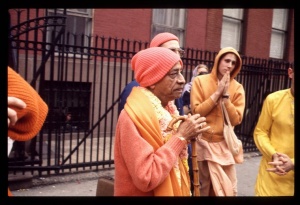SB 11.26.16: Difference between revisions
m (1 revision(s)) |
No edit summary |
||
| Line 1: | Line 1: | ||
{{info | {{info | ||
|speaker=King | |speaker=King Purūravā | ||
|listener=King | |listener=King Purūravā singing to himself | ||
}} | }} | ||
[[Category:Srimad-Bhagavatam - Canto 11 Chapter 26]] | |||
[[Category:Bhagavatam Verses Spoken by Pururava Maharaja - Vanisource|112616]] | |||
<div style="float:left">'''[[Srimad-Bhagavatam]] - [[SB 11|Eleventh Canto]] - [[SB 11.26: The Aila-gita|Chapter 26: The Aila-gītā]]'''</div> | |||
<div style="float:right">[[File:Go-previous.png|link=SB 11.26.15]] '''[[SB 11.26.15]] - [[SB 11.26.17]]''' [[File:Go-next.png|link=SB 11.26.17]]</div> | |||
{{RandomImage}} | |||
{{SBnotice}} | |||
==== TEXT 16 ==== | ==== TEXT 16 ==== | ||
<div | <div class="verse"> | ||
bodhitasyāpi devyā me | :bodhitasyāpi devyā me | ||
sūkta-vākyena durmateḥ | :sūkta-vākyena durmateḥ | ||
mano-gato mahā-moho | :mano-gato mahā-moho | ||
nāpayāty ajitātmanaḥ | :nāpayāty ajitātmanaḥ | ||
</div> | </div> | ||
| Line 17: | Line 22: | ||
==== SYNONYMS ==== | ==== SYNONYMS ==== | ||
<div | <div class="synonyms"> | ||
bodhitasya—who had been informed; api—even; devyā—by the goddess Urvaśī; me—of me; su-ukta—well-spoken; vākyena—by words; durmateḥ—whose intelligence was dull; manaḥ-gataḥ—within the mind; mahā-mohaḥ—the great confusion; na apayāti—did not cease; ajita-ātmanaḥ—who had failed to control his senses. | bodhitasya—who had been informed; api—even; devyā—by the goddess Urvaśī; me—of me; su-ukta—well-spoken; vākyena—by words; durmateḥ—whose intelligence was dull; manaḥ-gataḥ—within the mind; mahā-mohaḥ—the great confusion; na apayāti—did not cease; ajita-ātmanaḥ—who had failed to control his senses. | ||
</div> | </div> | ||
{{SBcollapse}} | |||
==== TRANSLATION ==== | ==== TRANSLATION ==== | ||
<div | <div class="translation"> | ||
Because I allowed my intelligence to become dull and because I failed to control my senses, the great confusion in my mind did not go away, even though Urvaśī herself gave me wise counsel with well-spoken words. | Because I allowed my intelligence to become dull and because I failed to control my senses, the great confusion in my mind did not go away, even though Urvaśī herself gave me wise counsel with well-spoken words. | ||
</div> | </div> | ||
| Line 31: | Line 36: | ||
==== PURPORT ==== | ==== PURPORT ==== | ||
<div | <div class="purport"> | ||
As described in the Ninth Canto of Śrīmad-Bhāgavatam, the goddess Urvaśī plainly told Purūravā that he should never trust women or believe their promises. Despite this frank advice, he became fully attached and thus suffered great mental anguish. | As described in the Ninth Canto of [[Srimad-Bhagavatam|''Śrīmad-Bhāgavatam'']], the goddess Urvaśī plainly told Purūravā that he should never trust women or believe their promises. Despite this frank advice, he became fully attached and thus suffered great mental anguish. | ||
</div> | </div> | ||
__NOTOC__ | </div> | ||
</div> | |||
<div style="float:right">[[File:Go-previous.png|link=SB 11.26.15]] '''[[SB 11.26.15]] - [[SB 11.26.17]]''' [[File:Go-next.png|link=SB 11.26.17]]</div> | |||
__NOTOC__ | |||
__NOEDITSECTION__ | |||
Revision as of 18:32, 3 July 2021

A.C. Bhaktivedanta Swami Prabhupada
Please note: The synonyms, translation and purport of this verse were composed by disciples of Śrīla Prabhupāda
TEXT 16
- bodhitasyāpi devyā me
- sūkta-vākyena durmateḥ
- mano-gato mahā-moho
- nāpayāty ajitātmanaḥ
SYNONYMS
bodhitasya—who had been informed; api—even; devyā—by the goddess Urvaśī; me—of me; su-ukta—well-spoken; vākyena—by words; durmateḥ—whose intelligence was dull; manaḥ-gataḥ—within the mind; mahā-mohaḥ—the great confusion; na apayāti—did not cease; ajita-ātmanaḥ—who had failed to control his senses.
Translation and purport composed by disciples of Śrīla Prabhupāda
TRANSLATION
Because I allowed my intelligence to become dull and because I failed to control my senses, the great confusion in my mind did not go away, even though Urvaśī herself gave me wise counsel with well-spoken words.
PURPORT
As described in the Ninth Canto of Śrīmad-Bhāgavatam, the goddess Urvaśī plainly told Purūravā that he should never trust women or believe their promises. Despite this frank advice, he became fully attached and thus suffered great mental anguish.